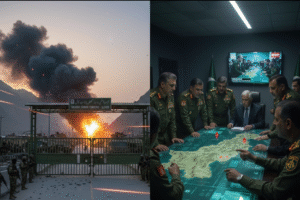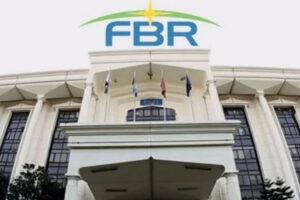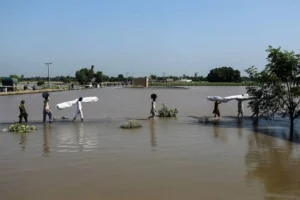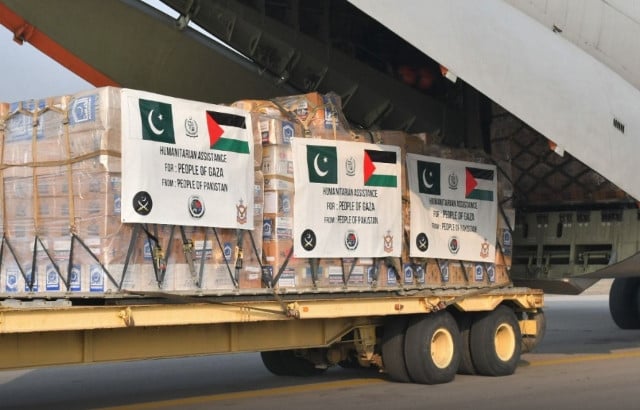Pakistan 21st aid consignment to Gaza marks another step in the country’s ongoing humanitarian campaign, with a fresh 100 ton shipment sent to ease urgent needs. The relief includes ration bags and ready to eat items intended for quick distribution to affected families. Moreover, coordinated logistics aim to speed delivery from the staging point to frontline partners.
What the shipment includes
Pakistan 21st aid consignment to Gaza focuses on high-need essentials: ration bags, cooked or ready-to-eat meals, and canned fruit to ensure immediate nutrition. Additionally, standard relief kits often contain cooking oil, flour, and hygiene items that help families stabilize in the short term. As a result, recipients can cover daily needs without complex preparation.
Where it departed and how it moves
Pakistan 21st aid consignment to Gaza departed from Lahore on a special flight, continuing the multi flight approach used across previous dispatches. Typically, consignments route through Egypt for handover to humanitarian partners who manage entry and distribution. Consequently, this model allows faster clearances and more predictable last-mile delivery.
Why the 21st consignment matters
Pakistan 21st aid consignment to Gaza signals persistence as well as scale, adding to cumulative tonnage that now spans dozens of shipments. Furthermore, consistent dispatches help relief groups plan warehouse cycles, align trucking, and synchronize handouts. In turn, civilians benefit from steadier access to basic food and essential supplies.
Coordination and oversight
Pakistan 21st aid consignment to reflects inter agency coordination between national authorities and partner organizations. Clear manifests, chain-of-custody processes, and documented handovers reduce losses and ensure traceability. Likewise, visibility on volumes and contents helps field teams match supply to assessed gaps.
Humanitarian context on the ground
Pakistan 21st aid consignment to Gaza arrives as agencies report persistent shortages and rising needs among displaced families. While food remains the top priority, safe water, shelter materials, and medical supplies also rank high. Therefore, flexible consignments that include shelf-stable foods and basic household items can make immediate impact.
Distribution and last-mile delivery
Pakistan 21st aid consignment to Gaza is typically broken down into standardized parcels to streamline handouts and reduce congregation times. To improve fairness, partners often use verified beneficiary lists and staggered distribution windows. Additionally, mobile teams can reach underserved areas when large centers face access constraints.
Transparency and accountability
Pakistan 21st aid consignment to Gaza continues the practice of documented departures, public briefings, and media-covered ceremonies. These touchpoints strengthen donor confidence and show recipients that support continues to arrive. Meanwhile, periodic summaries of total tonnage and item categories help the public track progress.
Challenges and risk mitigation
Pakistan 21st aid consignment still faces familiar challenges: corridor access, inspection delays, and security conditions along transfer routes. To mitigate these risks, planners diversify departure timings, pre stage goods, and keep contingency stocks. Moreover, standardized packing and clear labeling speed checks and shorten dwell time.
Community impact
Pakistan 21st aid consignment to supports families who rely on predictable rations to bridge gaps in market access and income. Even a single parcel of ready to eat food can cover several days for small households. Importantly, recurring deliveries reduce negative coping strategies, such as skipping meals or selling essential assets.
Looking ahead
Pakistan 21st aid consignment to sets the stage for follow up flights calibrated to needs assessments and corridor capacity. If access improves, larger consignments can expand item diversity to include hygiene kits, medical items, and shelter materials. Conversely, if constraints tighten, planners can prioritize the most calorie dense and high-impact goods.
How to help
Pakistan 21st aid consignment to Gaza highlights the value of coordinated giving through recognized channels. Donations routed via vetted partners help align supplies with actual needs and reduce duplication. Furthermore, cash based assistance when feasible lets families buy what they need most, supporting local markets and faster recovery.
Conclusion
Pakistan 21st aid consignment to underscores a sustained commitment to humanitarian support, delivering 100 tons of essential food and supplies when they are needed most. With steady coordination, transparent reporting, and adaptive planning, each new dispatch can reach more families, faster. Ultimately, continuity is key: regular flights, reliable handovers, and responsive logistics keep vital aid flowing to civilians who depend on it.

















